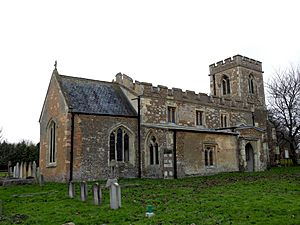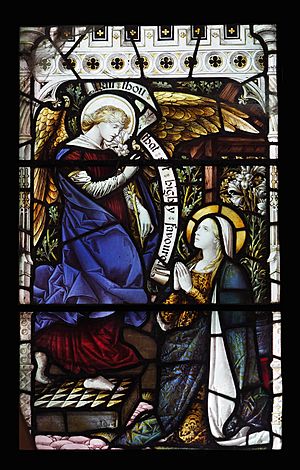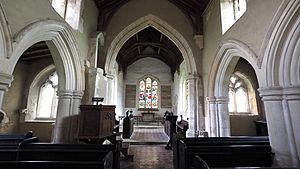St George's Church, Edworth facts for kids
Quick facts for kids St George's Church, Edworth |
|
|---|---|

St George's Church, Edworth, from the southeast
|
|
| Lua error in Module:Location_map at line 420: attempt to index field 'wikibase' (a nil value). | |
| OS grid reference | TL 222 407 |
| Location | Edworth, Bedfordshire |
| Country | England |
| Denomination | Anglican |
| Website | Churches Conservation Trust |
| History | |
| Dedication | Saint George |
| Architecture | |
| Functional status | Redundant |
| Heritage designation | Grade I |
| Designated | 31 October 1966 |
| Architectural type | Church |
| Style | Gothic |
| Closed | 1972 |
| Specifications | |
| Materials | Cobblestones, ironstone and limestone Roofs slated |
St. George's Church, Edworth, is a very old church located in the small village of Edworth, Bedfordshire, England. It's an Anglican church, which means it belongs to the Church of England. Today, it's a "redundant church," meaning it's no longer used for regular church services.
This special building is protected as a Grade I listed building. This means it's considered very important because of its history and architecture. The Churches Conservation Trust now takes care of it. Edworth village is about 3 kilometers (2 miles) southeast of Biggleswade, just east of the main A1 road.
Contents
History of St. George's Church
The church was first built around the year 1200. During the Middle Ages, it was connected to St Neots Priory, a type of monastery. Around 1320, some parts of the church were changed. The aisles, which are the side sections, were added. Also, the chancel, the area around the altar, was rebuilt.
The church's tower was built in the mid-1300s. Later, in the late 1400s, the porches were added. In the 1800s, the chancel was made a bit shorter. The church stopped being used for regular services on June 1, 1974. Then, on June 9, 1976, it was officially given to the Churches Conservation Trust to look after.
Church Architecture and Design
Outside the Church
St. George's Church is built using a mix of different stones. You can see cobblestones, ironstone, and limestone. Some parts of the walls are covered with a smooth finish called stucco. The roofs are covered with slate tiles.
The church has a main area called the nave with two sections, or "bays." It also has a clerestory, which is a row of windows high up. There are side sections called north and south aisles, and north and south porches. The chancel is at the east end, and there's a tower at the west end.
The tower was built in the 1300s. It has two levels and strong corner supports called buttresses. The top of the tower has a battlement design, like a castle wall. On the west side, the bottom part of the tower has a single window. The upper part has openings with two lights for the bells.
The large east window in the chancel was put in during the 1800s. It looks like windows from the 1400s. Both the north and south walls of the chancel have three-light windows from the 1400s. There's also a doorway from the 1300s on the south side that is now blocked up.
On both sides of the nave, west of the porches, are three-light windows from the 1400s. The clerestory has three square-headed windows with two lights on each side. Both main doorways of the church are from the 1300s.
The north aisle has two-light windows in its east and north walls. The south aisle has a two-light east window from the 1300s. In its south wall, there's a three-light window from the 1400s and a small single window. The porches were both added in the 1400s. They have similar styles with shallow pointed roofs called gables. The south porch has a two-light window on its west side, but the same window in the north porch is blocked.
Inside the Church
Inside, the church has arcades on each side. These are rows of arches supported by pillars. They run along the eastern part of the nave. In the northeast corner of the nave, there's a staircase that once led to a rood screen, which separated the nave from the chancel.
The font, where baptisms take place, is shaped like an octagon and dates from the 1400s. It has carved designs on its sides. In the north aisle, you can find a unique piscina, which is a basin used for washing sacred vessels. This one stands on a pillar and is from the 1100s. On the wall of the north aisle, there's a small piece of a wall painting from the 1300s.
In the chancel, there are pews from the 1400s. These pews have special carvings called poppyheads and finials shaped like lions and bears. Some of the windows in the chancel and clerestory still have small pieces of medieval stained glass.
The church has a set of three bells. The oldest bell was made in 1480 by a person named John Kebyll. The other two bells were made later, one in 1615 by Newcombe, and another in 1623 by William Haulsey.
See also
 | Bayard Rustin |
 | Jeannette Carter |
 | Jeremiah A. Brown |



